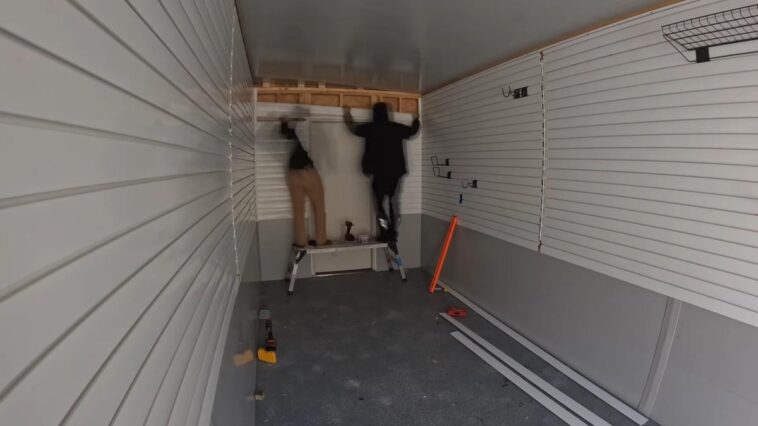Affiliate Disclosure: We may earn money or products from the companies mentioned in this post.
Your garage is more than just a space to park your car; it’s a versatile area that can serve as a workshop, a storage haven, or even a cosy hangout spot. However, when it comes to transforming your garage, the choice of wall materials plays a pivotal role in shaping its functionality, durability, and aesthetic appeal.
Traditional drywall has long been the default choice, but what if there were alternatives that could better suit the unique demands of a garage environment?
10 Drywall Alternatives for Garage You Can Trust
When it comes to finishing the walls of your garage, traditional drywall might not always be the best option. Whether you’re looking for increased durability, better insulation, or a unique aesthetic, there are several drywall alternatives for garages worth considering.
Here are alternatives to traditional drywall, each with its own set of benefits:
1. Plywood or OSB (Oriented Strand Board)
Plywood and OSB are cost-effective alternatives that provide structural stability to your garage walls. They are easy to install and can be painted or finished for a polished look. However, they may not offer the same level of insulation as other materials.
2. Plywood with Drywall Mud Finish
Combine the durability of plywood with the smooth finish of drywall mud for a unique and cost-effective solution. This method allows you to create a textured or artistic finish, adding character to your garage walls.
3. Shiplap or Tongue and Groove Paneling
For a rustic or farmhouse aesthetic, consider shiplap or tongue and groove panelling. These wooden planks interlock, creating a visually appealing and sturdy wall surface. They are relatively easy to install and can be left natural or painted to suit your style.
4. Fiber Cement Board
Fibre cement board is a durable and moisture-resistant material that works well in garage environments. It is resistant to mould, fire, and pests.
Additionally, it can be painted, allowing for customization. Fibre cement board provides excellent longevity and requires minimal maintenance.
5. Metal Panels
Metal panels, such as corrugated steel or aluminium, offer your garage an industrial and modern look. They are resistant to moisture, insects, and fire.
Metal panels are relatively lightweight and can be installed with ease. Consider them for a sleek and contemporary design.
6. PVC Wall Panels
PVC wall panels are a practical choice for garages, particularly in moisture-prone areas. They are resistant to water, mould, and mildew, making them an excellent option for damp environments.
PVC panels are also easy to clean, adding convenience to garage maintenance.
7. Insulated Wall Panels
If insulation is a top priority, consider insulated wall panels. These panels typically consist of a foam core sandwiched between two layers of material, providing enhanced thermal insulation.
This helps regulate the temperature in your garage, making it more energy-efficient.
8. Treated Wood Siding
Treated wood siding is a classic choice that adds a natural and warm feel to your garage. The treatment makes the wood resistant to decay and insects.
This option allows for a wide range of finishes, from natural wood tones to painted surfaces.
9. Pegboard or Slatwall
If you’re looking for a versatile and functional option, pegboard or slatwall systems are worth considering.
These materials allow you to customize your garage walls with hooks, shelves, and other accessories, providing excellent organization and storage solutions.
10. Textured Wall Panels
For a modern and textured finish, explore 3D wall panels. These panels come in various patterns and designs, adding depth and visual interest to your garage walls. They are typically made from materials like gypsum or PVC and are relatively easy to install.
Before deciding, consider your specific needs, budget, and the overall aesthetic you want to achieve. Each alternative comes with its own set of advantages, so take the time to weigh the pros and cons based on your preferences and the functionality of your garage space.
Whether you prioritize durability, insulation, or a unique design, there’s a drywall alternative that can meet your requirements and transform your garage into a functional and visually appealing space.
Are Drywall Alternatives For Garages More Expensive Than Traditional Drywall?
The cost comparison between drywall alternatives for garages and traditional drywall is a multifaceted consideration that involves various factors. While traditional drywall has long been a standard choice, alternative materials have gained popularity for their unique qualities. Let’s delve into the factors influencing the cost and whether these alternatives are more expensive than traditional drywall.
Traditional drywall, composed of gypsum plaster pressed between paper layers, has been a cost-effective choice for decades. Its affordability stems from the widespread availability of materials and a relatively straightforward installation process. However, when assessing costs, it’s crucial to consider the full lifecycle expenses, including maintenance and potential repairs.
Drywall alternatives, on the other hand, may exhibit higher upfront costs. Materials such as fibreglass-reinforced panels, cement boards, or engineered wood panels often come at a premium compared to traditional drywall sheets. This initial expense can be a deterrent for some homeowners or builders. However, the long-term benefits of these alternatives may outweigh their initial costs.
The primary factor influencing the cost of drywall alternatives is the material composition. For instance, materials designed to resist moisture, mould, and impact damage might be pricier due to their enhanced durability and specialized features. Similarly, alternatives with superior insulation properties could command a higher price tag.
It’s important to note that the installation costs also contribute significantly to the overall expenses. Some drywall alternatives may require professional installation, adding labour charges to the project. Conversely, if a material is DIY-friendly, homeowners may save on installation costs but should factor in their own time and skill level.
While drywall alternatives may appear more expensive upfront, their long-term benefits often justify the investment. Enhanced durability can result in fewer repairs and replacements, potentially offsetting the initial higher cost. Moreover, certain alternatives, such as those with superior insulation properties, may contribute to energy savings over time, providing additional financial advantages.
Are Drywall Alternatives Resistant To Moisture And Mold In Garage Environments?
Drywall alternatives designed for garage environments often offer improved resistance to moisture and mould compared to traditional drywall. Garages are susceptible to fluctuating temperatures, humidity, and occasional exposure to moisture, making it essential to choose materials that can withstand these conditions.
Here’s a closer look at how drywall alternatives address the challenges of moisture and mould in garage settings.
1. Moisture Resistance
Traditional drywall is made of gypsum and paper, which are susceptible to damage from moisture. In contrast, many drywall alternatives feature moisture-resistant properties, making them more durable in garage environments.
Materials such as fibreglass-reinforced panels, cement boards, and certain types of gypsum boards are engineered to repel moisture, preventing warping, swelling, and other issues associated with prolonged exposure to damp conditions.
2. Mould Resistance
Mold thrives in damp environments, and garages can be prone to mould growth, especially if there are water leaks or poor ventilation. Drywall alternatives often incorporate mould-resistant additives or are made of materials that naturally deter mould growth.
This proactive approach helps maintain a healthier indoor environment and extends the lifespan of the wall materials.
3. Fibreglass-reinforced panels (FRP)
FRP panels are a popular drywall alternative known for their exceptional resistance to moisture and mould. These panels are made of a reinforced plastic composite, providing a non-porous surface that doesn’t absorb water.
Additionally, FRP panels are easy to clean, making them a practical choice for garage spaces where cleanliness and hygiene are important.
4. Cement Boards
Cement boards, composed of cement and reinforcing fibres, are inherently resistant to moisture. They are commonly used in wet areas, such as bathrooms and kitchens, making them a reliable choice for garages where occasional exposure to water is possible.
Cement boards are also resistant to mould growth, adding an extra layer of protection in garage environments.
5. Preventative Measures
While drywall alternatives contribute significantly to moisture and mould resistance, it’s important to address potential sources of water ingress and ensure proper garage ventilation.
Regular inspections for leaks, proper drainage, and adequate airflow can complement the efforts of moisture-resistant materials, providing a comprehensive approach to maintaining a dry and mold-free garage.


